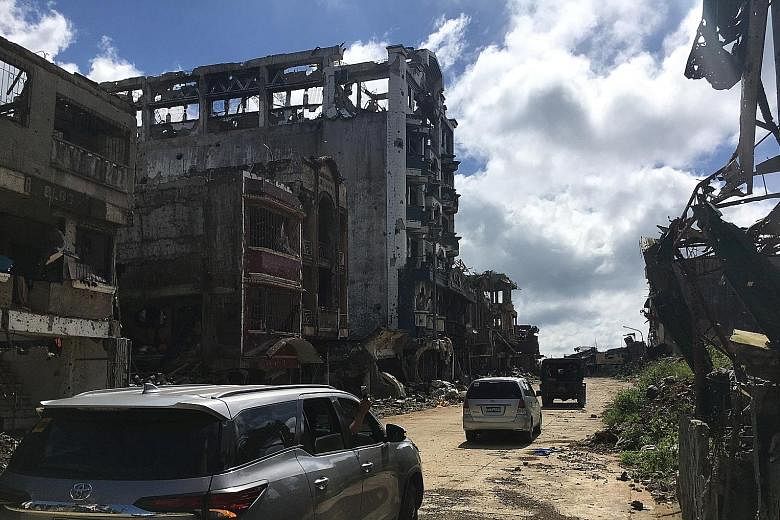MARAWI CITY • Islamist insurgents looted cash, gold and jewellery worth tens of millions of dollars when they occupied a southern Philippine town last year, treasure that one of their leaders has used to recruit around 250 fighters for fresh attacks.
The military said Humam Abdul Najib escaped from Marawi City, which the militants had hoped to establish as a stronghold for the Islamic State in Iraq and Syria (ISIS) in South-east Asia, before it was recaptured by the military in October after five months of ferocious battles and aerial bombardment.
Since then, Najib, also known as Abu Dar, has used the booty looted from bank vaults, shops and homes in Marawi to win over boys and young men in the impoverished southern province of Lanao del Sur, military officers in the area said.
Hardened mercenaries have also been lured.
As a result, ISIS followers remain a potent threat in South-east Asia even though hundreds of militants were killed in the battle for Marawi, military officers said.
"Definitely they haven't abandoned their intent to create a caliphate in South-east Asia," Colonel Romeo Brawner, the deputy commander of Joint Task Force Marawi, told Reuters. "That's the overall objective, but while they are still trying to recover and build up again - fighters and weapons - our estimate is they are going to launch terrorist attacks."
Last Saturday, militants wounded eight soldiers in two attacks in Lanao del Sur, Col Brawner said, the first such violence since the recapture of Marawi.
In the early days of the occupation of Marawi last May, as black-clad fighters burned churches, released prisoners and cut the power supply, other militants targeted banks and the homes of wealthy citizens, commandeering hostages to help with the plunder.
"It was in the first week. They divided us into three groups with seven people each," said construction worker J.R. Montesa, a Christian, who was captured.
Using explosives, the militants blew open the vaults of the city's three main banks - Landbank, the Philippine National Bank and the Al Amanah Islamic Bank, Mr Montesa told Reuters in a town near Marawi.
They easily slipped out of Marawi because a security cordon was not fully in place. They also raided jewellers, pawnshops and businesses.
Landbank and Al Amanah did not respond to requests for comment. Philippine National said it was recovering losses.
The Islamic celebration of Ramadan was looming at the time the militants struck and banks, businesses and homes had more money than usual, said Marawi City police chief Ebra Moxsir.
The Maranaos, the ethnic group that dominates the area around Marawi, are mostly Muslims.
"Maranaos keep millions of pesos in safety vaults in their homes. Gold, also," he told Reuters. "It is a tradition of the Maranao to give gifts of money (during Ramadan)."
Mr Montesa said the vans they loaded with the spoils of the raids were "overflowing", with money and other valuables stuffed into every crevice of the vehicles.
REUTERS

